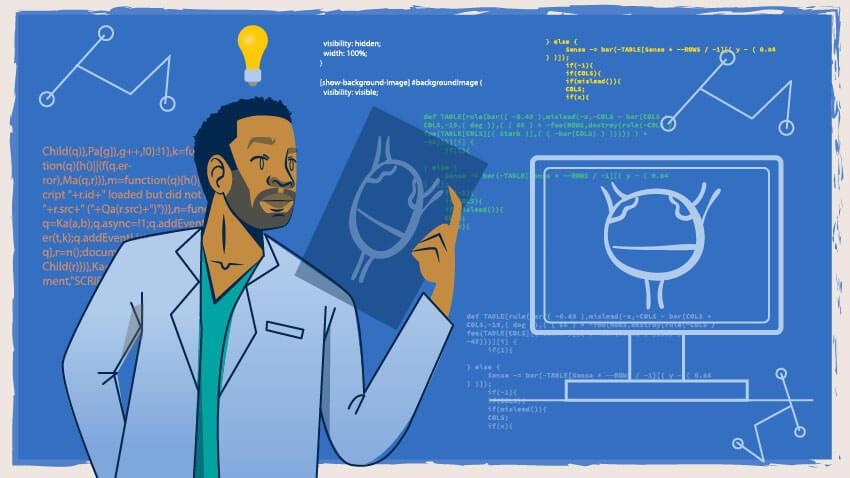An artificial intelligence (AI)-based platform, developed in multi-institutional collaborative research, enhanced the evaluations of providers regarding whether bladder cancer patients had a total response to chemotherapy treatment prior to a radical cystectomy (bladder removal surgery).

Image Credit: Justine Ross/Michigan Medicine.
Nevertheless, the scientists warn that AI is not a substitute for human skills and that their tool should not be employed as such.
If you use the tool smartly, it can help you.
Lubomir Hadjiyski, PhD., Senior Study Author and Professor of Radiology, University of Michigan Medical School
When patients are diagnosed with bladder cancer, surgeons mostly take out the whole bladder in an attempt to prevent the cancer from spreading or returning to other organs or areas. New proof is collating, though, that surgery may not be needed if a patient exhibits zero evidence of cancer after chemotherapy.
Conversely, it is hard to establish if the lesion left after treatment is just tissue that has become scarred or necrotic due to the treatment or whether the cancer is still prevalent. The scientists speculated if AI could assist in this matter.
The big question was when you have such an artificial device next to you, how is it going to affect the physician? Is it going to help? Is it going to confuse them? Is it going to raise their performance or will they simply ignore it?
Lubomir Hadjiyski, PhD., Senior Study Author and Professor of Radiology, University of Michigan Medical School
A total of 14 physicians from various specialties — including urology, radiology and oncology — as well as two fellows and a medical student, examined scans of 157 bladder tumors taken pre- and post-treatment.
The providers provided ratings for three measures that evaluated the level of response to chemotherapy as well as a suggestion for the next treatment step for each patient (surgery or radiation).
Next, the providers studied a score computed by the computer. Lower scores specified a lower probability of full response to chemotherapy and vice versa for higher scores. The providers could review their ratings or leave them untouched. Their concluding ratings were compared against samples of the tumors extracted during their bladder removal surgeries to test correctness.
Across various specialties and skill levels, providers observed improvements in their evaluations with the AI platform. Those with less skill had even more advantages, so much so that they could make diagnoses at the same level as the skilled participants.
That was the distinct part of that study that showed interesting observations about the audience.
Lubomir Hadjiyski, PhD., Senior Study Author and Professor of Radiology, University of Michigan Medical School
The tool aided providers from academic establishments more than those that were employed at health centers concentrated exclusively on clinical care.
The research is part of an NIH-sponsored project, directed by Hadjiyski and Ajjai Alva, M.D., an associate professor of internal medicine at U-M, to create and assess biomarker-based tools for treatment response decision support of bladder cancer.
With over 20 years of experience in performing AI-based studies to evaluate various types of cancer and their treatment response, Hadjiyski states he has witnessed that machine learning tools can be valuable as a second opinion to aid doctors in decision making, but they can also make errors.
“One interesting thing that we figured out is that the computer makes mistakes on a different subset of cases than a radiologist would,” he added. “Which means that if the tool is used correctly, it gives a chance to improve but not replace the physician’s judgment.”
The other authors of the study include Di Sun, Ajjai Alva, Heang-Ping Chan, Richard H. Cohan, Elaine M. Caoili, Wesley T. Kerr, Matthew S. Davenport, Prasad R. Shankar, Isaac R. Francis, Kimberly Shampain, Nathaniel Meyer, Daniel Barkmeier, Sean Woolen, Phillip L. Palmbos, Alon Z. Weizer, Ravi K. Samala, Chuan Zhou and Martha Matuszak of U-M; Yousef Zakharia, Rohan Garje and Dean Elhag of the University of Iowa; Monika Joshi and Lauren Pomerantz of Pennsylvania State University; Kenny H. Cha of the Center for Devices and Radiological Health at the U.S. Food and Drug Administration and Galina Kirova-Nedyalkova of the Acibadem City Clinic at Tokuda Hospital in Sofia, Bulgaria.
Journal Reference:
Sun, D., et al. (2022) Computerized Decision Support for Bladder Cancer Treatment Response Assessment in CT Urography: Effect on Diagnostic Accuracy in Multi-Institution Multi-Specialty Study. Tomography. doi.org/10.3390/tomography8020054.